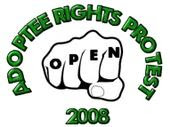 CBS News,
CBS News,
November 12, 2007States Urged To Let Adoptees See Records
NEW YORK, Nov. 12, 2007 (CBS/AP) It is among the most divisive questions in the realm of adoption: Should adult adoptees have access to their birth records, and thus be able to learn the identity of their birth parents?
In a comprehensive report being released Monday, a leading U.S. adoption institute says the answer is "Yes" and urges the rest of America to follow the path of the eight states that allow such access to all adults who were adopted.
"States' experiences in providing this information make clear that there are minimal, if any, negative repercussions," said the Evan B. Donaldson Adoption Institute. "Outcomes appear to have been overwhelmingly positive for adult adopted persons and birthparents alike."
For years there has been an assumption privacy was in the best interests of the birth parents who give up their children and the families who adopt them, reports CBS News correspondent Cynthia Bowers.
Today's report suggests otherwise. It found when states open records:
# The number of adoptions did not drop.
# Abortions did not rise.
# There were no unwanted intrusions.
# Ninety-five percent of birth parents said they were open to contact by their children.
Opponents of open access argue that unsealing birth records violates the privacy that birthmothers expected when they opted to give up their babies. They raise the specter of birthparents forced into unwanted relationships with grown children who have tracked them down.
But the Donaldson Institute says most birthparents, rather than being fearful and ashamed, welcome contact with the children they bore.
Kansas and Alaska never barred adoptees from seeing their birth certificates. Since 1996, six other states - Alabama, Delaware, Maine, New Hampshire, Oregon and Tennessee - have decided to allow access to all adult adoptees.
However, the progression has been slow, and open-records legislation has been rebuffed in many states by a determined and diverse opposition.
Opponents in Connecticut, where bills have failed in each of the past two years, included the state chapter of the American Civil Liberties Union. It depicted itself as a voice for birthmothers who opposed the measure but were reluctant to speak out publicly.
In New Jersey, where a long-running campaign to pass an open-re+cords bill was derailed again this year, the opposition includes New Jersey Right to Life and the New Jersey Catholic Conference. They argue that eliminating the prospect of confidentiality might prompt a pregnant single woman to choose abortion rather than adoption.
Marlene Lao-Collins of the Catholic Conference said she knew of no data supporting the concerns about abortions, "but even if it just happened once, that would be one too many."
Nationwide, one of the major foes of open records is the National Council for Adoption, which represents many religiously affiliated adoption agencies. Its president, Thomas Atwood, says any reconnection between an adopted adult and a birthparent should be by mutual consent - which is the policy in most states.
"I empathize with anybody who feels the need to know their biological parents' identity," Atwood said. "But I don't think the law should enable them to force themselves on someone who has personal reasons for wanting confidentiality."
The Donaldson report says evidence from the states with open records rebuts every argument against the concept. Notably, it says there is no proof that abortions rise, that adoptions decline, or that birthparents are harassed following a switch to open records.
"There has been no evidence that the lives of birthmothers have been damaged as a result," the report says. "In the states that have amended their laws ... few birthmothers have expressed the desire to keep records sealed or the wish not to be contacted."
The most recent state to opt for open records is Maine; a law signed in June will allow adult adoptees to access their birth certificates starting in 2009.
One of the bill's main sponsors was state Sen. Paula Benoit, an adoptee who personally lobbied all her colleagues. While working on the bill, she uncovered her own biological background and learned, to her amazement, that two Democratic lawmakers she was working with were her nephews.
"There are so many adoptees who want to know who they are," she said. "Can you imagine being denied your identity?"Among the many birthmothers grateful to have been found by children they relinquished is Eileen McQuade of Delray Beach, Florida, who is president of the American Adoption Congress and a fervent advocate of open records.
"Secrecy was the way it was done at the time - it was not a choice or a preference on the part of the mothers," McQuade said of the 1960s, when she placed a daughter for adoption. "We treat adoptees as if they're forever children - it's absurd."
The Donaldson report depicts adopted people as the only class of Americans not permitted to routinely obtain their birth certificates.
Giving them full access "is a matter of legal equality, ethical practice and, on a human level, basic fairness," the report said. "It is an essential step toward placing adoptive families, families of origin, everyone connected to them and, indeed, adoption itself on a level playing field within society, without the stigma, shame and inequitable treatment they have experienced in the past."
"The mythology around adoption is based on the notion that you should be protecting someone from something," said the institute's executive director, Adam Pertman.
"But that's not the reality," he said. "Adoptees are not behaving poorly, they're behaving very respectfully, and birthparents do not appear to be a frightened class that wants to hide."
Link to articleAlso see video at link
 ADA EVENING NEWS,
ADA EVENING NEWS,










